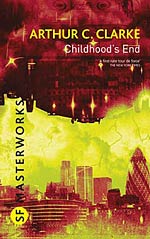
![]() Emil
Emil
2/15/2011
![]()
When we refer to the predictive power of sf, Arthur C Clarke's name is often the first to be mentioned. Having studied physics and mathematics Clarke is always intend on providing the reader with convincing visions of what the future might hold. Not known to be a master prose stylist, Clarke does extends himself with Childhood's End, managing to combine efficient story-telling with a typical H G Wells-type of social awareness and a little of the visionary grandeur associated with Olaf Stapledon, with clandestine suggestions of religious mysticism sheltering behind all the science.
This is part utopia and part comical variation of alien invasion, but finishes with a haunting image of mutated children of Earth destroying their world as they leave material existence behind, the inevitable next evolutionary leap. Clarke initially describes a classic utopia, and then shows it as fatally and inherently flawed, ending in apocalypse. He expounds a most detailed and attractive utopia: poverty, crime and unhappiness become forgotten scourges of the time before the Overlords, and yet ... sadly ... it is a dead end - there is boredom and a virtual end of all creative art. The end of the novel shows not the creation of an ideal society, but rather humanity rising from the craddle of Earth, evolving into ... something else all together. As Greg Bear would do later with Blood Music, the end of human conflict and the advent of perfect harmony and understanding is expressed (only) through the swallowing up of all humanity into one giant organism/energy. Mankind can only survive by becoming utterly inhuman. This is exactly like death, although the concept of an Overmind sounds much nicer.
It's a good read, proving to be one of the most long-lasting and influential exponents of sf.